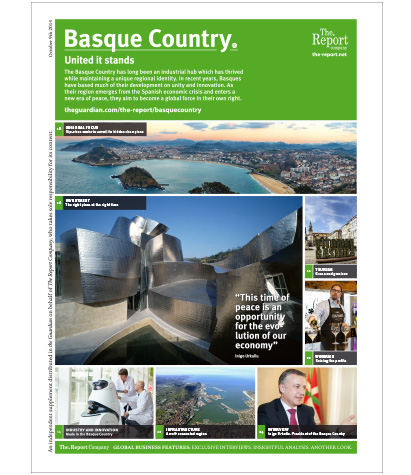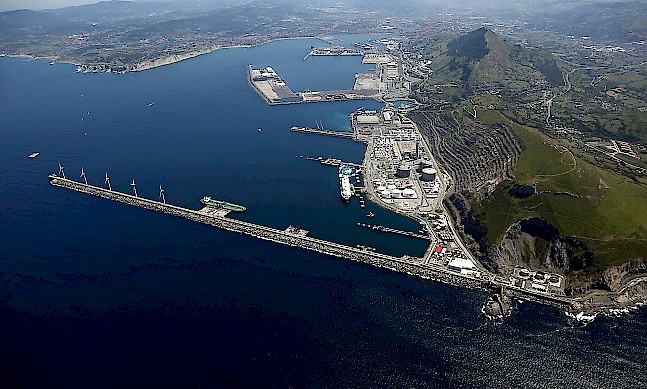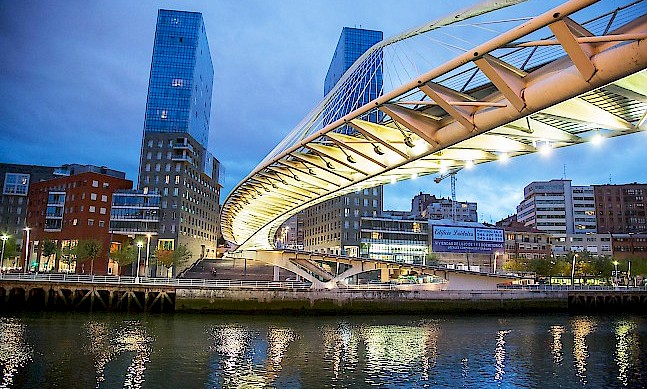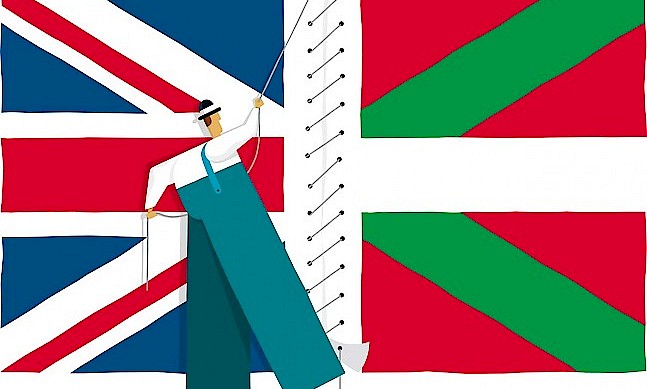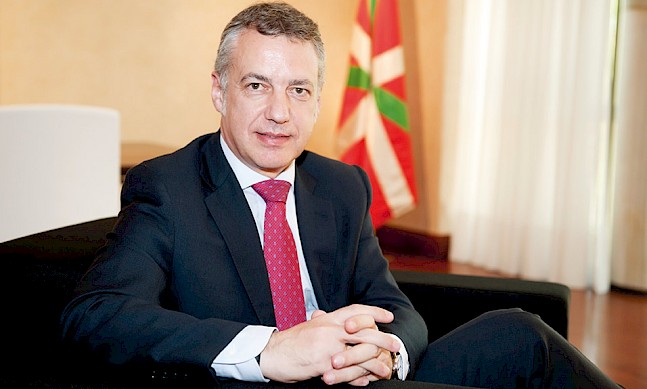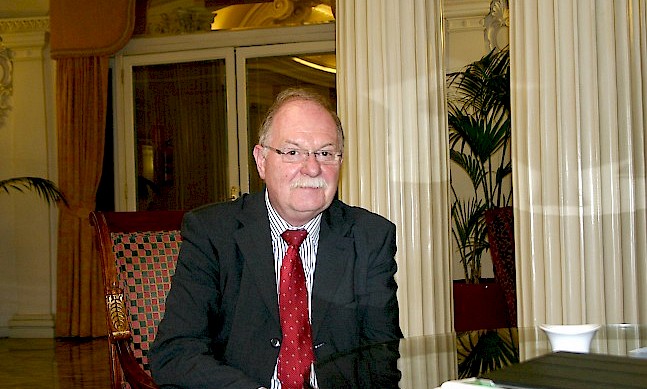Basque tool manufacturer EGA Master has become a world leader in its field, serving a diverse range of industries, from oil and gas to mining, aerospace, automotive and engineering. Founded in 1990 by Inaki Garmendia, today the company’s tools can be found in over 150 countries, and it counts blue-chip firms among its clients.
The Report Company: How would you define EGA Master’s company identity?
Inaki Garmendia: The desire to create and improve is what drives the evolution of our company. EGA Master’s experience lies in the world of hand tools. We have diversified our offering to more than 20,000 varieties of products, and this has been made possible by applying the innovative manufacturing model of horizontal integration.
We invest about seven percent in research, development and innovation – five times more than the industry average. We have developed about 200 patents, including the Basque wrench, which has become an award-winning tool and helped us to strengthen our position in the initial phase of internationalisation.
Our constant evolution has made us the world leader in tools and safety equipment. We are the only manufacturer to have developed ten different ranges of products, including for underwater use.
TRC: What is the guiding philosophy of the company?
IG: Total customer focus. We add value to our customers’ business, anticipate their needs and expectations and ensure their satisfaction. We innovate to create added value. We also believe in internationalisation as a source of information and as a key element of learning, continuous improvement and diversification. Also important to us is the human factor, because we are convinced that great strategies and ideas are worthless without an equally great team capable of developing and implementing them.
TRC: What is EGA Master’s recipe for success?
IG: EGA Master was born in 1990, in the midst of a double crisis: a global crisis and crisis specific to the manufacturing of tools in this country. All the manufacturers were vertically integrated, while the most modern and advanced industries, such as aircraft and automotive, were horizontally integrated and getting great results. Since the beginning we’ve been working with the model of horizontal integration, focusing on those parts of the process that add more value, capitalising on our strengths and taking advantage of the strength of others.
“Our constant evolution has made us the world leader in tools and safety equipment. We are the only manufacturer to have developed ten different ranges of products.”Tweet This
TRC: How important is R&D to the company?
IG: For us, it is essential to incorporate innovation into the overall strategy of the company. We work with Euskalit (the Basque foundation for quality management) to analyse our innovativeness in six key areas of the organisation: strategy, market and customers, partnerships and resources, people, leadership, and outcomes. Innovation transforms knowledge into value, developing it commercially and industrially to yield the best results.
Innovation also forms an essential part of the marketing strategy. Globalisation generates an inexhaustible source of information, knowledge, continuous improvement and competitiveness. Internationalisation, in turn, promotes innovation because it allows us to anticipate trends and allows immediate and instant access to everything that happens in places of influence and decision making.
Innovation is therefore one of the crucial factors for global competitiveness. Innovation shouldn’t only be applied to the product but to the comprehensive service offered to the market. Innovation should also include internal processes so that companies become more dynamic, adaptable and efficient organisations.
TRC: Your focus on R&D has led you to collaborate with institutions seemingly unrelated to your business. What is the relationship between EGA Master and the European Organisation for Nuclear Research?
IG: At EGA Master we have a strategy that sets us apart from our competitors. We have diversified our products to be able to have a comprehensive offering that meets all the needs of industry. We have managed to meet the requirements of the European Organisation for Nuclear Research by manufacturing titanium tools which are anti-magnetic, which is essential for work with the LHC particle accelerator at CERN. EGA Master tools are used at CERN in the search for the Higgs boson.
TRC: What can you tell us about your internationalisation strategy?
IG: When creating EGA Master, the strategic plan established among other objectives to dedicate 70-80 percent of sales to export. Right now we are at 90 percent. It also established that no market would represent more than 15 percent and that no single customer would exceed eight percent of our sales. These goals have led us to have an active presence in over 150 countries on five continents.
This strategy of commercial self-control could have restrained the rapid expansion of sales; instead, it has generated an additional motivation to work even harder to address the world’s most atypical, distant or difficult markets. The result is more than satisfying, it’s rewarding. Currently, 40 percent of our exports go to the most restricted emerging countries, where demand is growing and there is little competition.
“The Basque Country has an established industrial tradition and has become home to top brands. It is competitive, with a high level of technology, flexibility and agility.”Tweet This
TRC: What are the advantages and disadvantages to going global?
IG: The only difficulties are the ones inherent to a company’s development. All the rest are advantages. Internationalisation is not only necessary to be globally competitive; it is a source of knowledge which in addition to building bridges and breaking barriers, promotes interpersonal relationships. Competing with the best makes you stronger and adversity forces you to improve. Internationalisation allows you to capture in real time both the needs and the developments of the market and of your competitors. It helps you to be competitive and diversified.
TRC: How has its internationalisation strategy helped the company cope with the economic crisis?
IG: In times of recession the company’s globalisation is of maximum value. Clearly, in times of expansion, internationalisation can expand the market, which means increased production and turnover. However, when there is weak demand, the commitment to diversification of the markets becomes the rationale, because it acts as a safety net. Talking about our experience, the real lifesaver for EGA Master has not been selling in more than 150 countries per se, but rather having the certainty of knowing that the crisis can’t be extended to all the countries at once, simultaneously. While in 2009 the economy was in recession in the EU or in the US, there was sustained growth in countries like the Gulf states, Nigeria, China, India, Brazil, Colombia, Chile, Peru and Mexico.
TRC: What impact did the economic crisis have on EGA Master?
IG: Our position in the domestic market is no more than 10 percent of our total sales. We are very pleased with how we overcame the crisis. We have continued to grow both in results and in job creation. We have turned to other more favourable markets, and others that are very attractive due to their economic growth, such as Vietnam, Yemen, Algeria and Ethiopia.
This allowed us to avoid the economic storm without trauma, and even substantially improve our position in the world market, gaining market share from our competitors. Our strong commitment to innovation and internationalisation was fundamental in this achievement. These are the two strategic pillars that have helped EGA Master to achieve the best results ever during the crisis of 2008-2012. We continue to deal with cautious optimism with the worst economic times since the Second World War.
“We have thriving business associations, clusters that facilitate business cooperation and interaction, prestigious technology parks and an extensive and reputable university structure.”Tweet This
TRC: What would you consider to be key factors for a successful growth strategy?
IG: Innovation and internationalisation will always be essential strategies to be competitive in a sustainable manner, which is mandatory for companies in the 21st century. These are strategies that will help generate wealth in the years of prosperity to come and also to deal with the next crisis.
While innovation and internationalisation are strategic bets behind closed doors, competitiveness is the end result. Competitiveness enables a company to expand its sales network, spread the risk, establish an online network of knowledge and information about market trends, innovate in products according to the needs of the end users and provide them with quality and distinction at the best price.
TRC: What is the medium-term objective of EGA Master?
IG: To further strengthen and consolidate the company as a world leader in tools, equipment and safety devices. All this can be achieved with a well-trained team that is young, creative, caring, and committed to the project and the values of the organisation. The idea is to take internationalisation as a key source of diversification, learning and continuous improvement. No matter how wonderful the present is, it has an expiration date.
TRC: What needs to be done to promote the Basque Country to foreign investors?
IG: The Basque government is working in two main areas. Firstly, it is working to attract investment to consolidate the economy and trying to be selective in industries which are already competitive but need internal diversification, such as energy, automotive, aerospace, electronics, machine tools, marine industry and biosciences. On the other hand, it knows that while attracting new foreign investment is important, so is maintaining and developing existing investments. The Basque government has set up the SPRI network, which is specifically focussed on attracting foreign investment.
TRC: How would you characterise the Basque Country as a place to do business?
IG: The Basque Country has an established industrial tradition and has become home to top brands. It is competitive, with a high level of technology, flexibility and agility. We have a highly skilled and qualified workforce, a vast network of infrastructure and technology centres, an advanced and extensive culture of quality certification and excellence in business management, and a privileged position in European rankings. We have thriving business associations, clusters that facilitate business cooperation and interaction, prestigious technology parks and an extensive and reputable university structure.


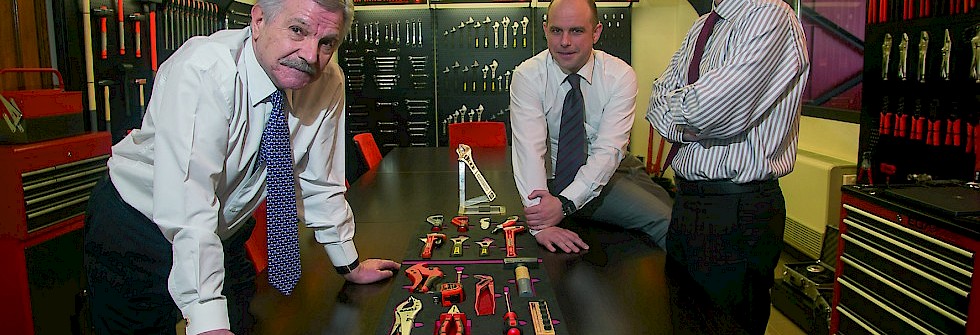 Iñaki Garmendia Ajuria with his sons Iñaki and Aner. Photo: EGA Master
Iñaki Garmendia Ajuria with his sons Iñaki and Aner. Photo: EGA Master
